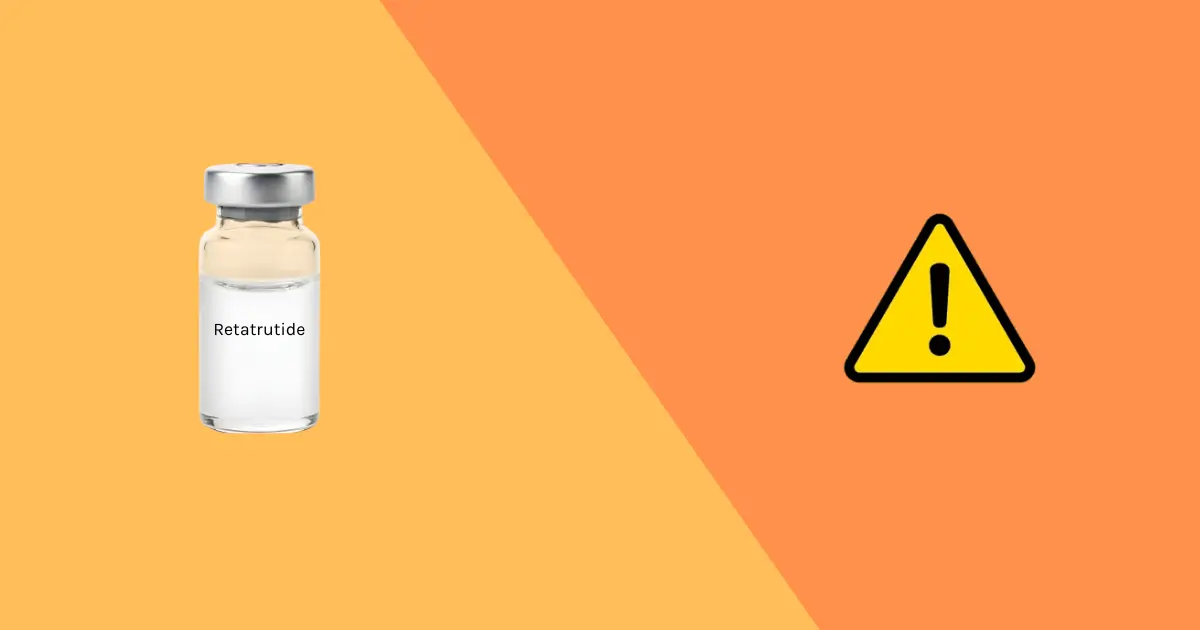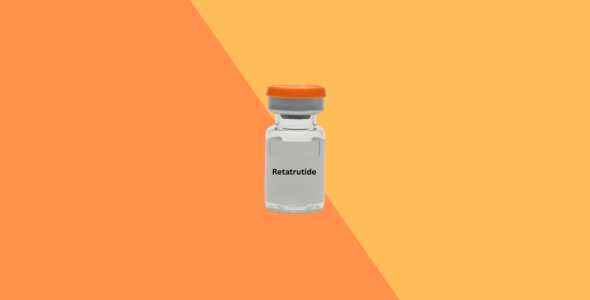Retatrutide side effects: What to know
Retatrutide promises major weight loss, but what are the side effects you need to know?
Key highlights
- Retatrutide is an emerging blockbuster weight loss medication that acts on three receptors (GLP-1, GIP, and glucagon) simultaneously to suppress appetite and promote weight reduction.
- Common side effects of retatrutide include nausea, vomiting, constipation, fatigue, diarrhea, headaches, and abdominal discomfort. These are similar to other GLP-1 medications, but the intensity and severity of these side effects are slightly higher with retatrutide.
- Serious side effects of retatrutide are hypersensitivity reaction, pancreatitis, gallbladder issues, hypoglycemia, cardiovascular event, liver disorders, and renal issues, but they are rare.
- Currently, retatrutide is in phase 3 clinical trials to determine its long-term safety and efficacy for weight loss in obese and overweight individuals, knee osteoarthritis, and obstructive sleep apnea.
Retatrutide is a breakthrough weight loss medication that is generating significant buzz for good reasons. The medication has a triple action on GLP-1, GIP, and glucagon receptors, making it more effective for blood sugar control and weight loss than current medications such as semaglutide, tirzepatide, dulaglutide, and liraglutide.
Currently, retatrutide is in phase 3 clinical trials to get FDA approval. The medication is expected to be a blockbuster for weight loss. A study published in the New England Journal of Medicine (NEJM) demonstrates that retatrutide is an experimental weight loss medication that showed extraordinary weight loss results in phase 2 clinical trials. The medication reduced 17-24% of body weight with consistent use over 48 weeks.
Like other weight loss medications, retatrutide is commonly associated with gastrointestinal side effects such as nausea, vomiting, diarrhea, abdominal pain, and constipation. These are typically dose-dependent, and their severity increases with dose increments during the titration phase.
This article will explore the side effect profile of retatrutide based on current clinical trial data and explain why they happen, highlight rare or serious side effects, and provide practical tips for patients and clinicians on monitoring and management. Remember, retatrutide is an investigational (not yet widely approved) medication and its long-term safety is still being studied.
What is retatrutide?
Retatrutide is an injectable triple agonist that targets GIP (glucose-dependent insulinotropic polypeptide), GLP-1, and glucagon receptors (GCG receptors) simultaneously. The medication activates GLP-1 (glucagon-like peptide-1) receptors to promote insulin release, slow gastric emptying, and suppress appetite. Its action on GIP receptors enhances insulin secretion and glucose reuptake, which lowers blood sugar levels. By occupying glucagon receptors, it increases energy expenditure, improves metabolic health, and slows gastric emptying.
The synergistic effect of activating all three receptors simultaneously promotes significant weight loss and better metabolic control than other existing GLP-1 receptor agonists, such as semaglutide (Wegovy and Ozempic), liraglutide, dulaglutide, and dual-agonists like tirzepatide (Mounjaro and Zepbound).
A phase 2 clinical trial, published in The New England Journal of Medicine, included 338 adults with a body mass index (BMI) of 30 or greater, or a BMI between 27 and 30, with at least one weight-related comorbidity to assess the efficacy and benefits of retatrutide. Participants were assigned to receive weekly doses of retatrutide at 1 mg, 4 mg, 8 mg, or 12 mg for 48 weeks, or placebo. On average, individuals treated with retatrutide experienced a 17.5% reduction in body weight at 24 weeks and a 24.2% reduction after 48 weeks. Metabolic improvements were also observed in these patients.
The phase 2 clinical trial was conducted in the United States and included 281 participants. They were randomly assigned to receive either a placebo, varying doses of retatrutide, or 1.5 mg dulaglutide through weekly injections. The results showed the greatest weight loss with the 4 mg and higher doses of retatrutide compared to both the placebo and 1.5 mg dulaglutide groups. Participants receiving 12 mg retatrutide showed a -2.02% decrease in HbA1c levels in patients with type 2 diabetes, compared to -0.01% in the control group. In addition, retatrutide improved insulin sensitivity, decreased lipid levels, and reduced liver enzymes (ALT and AST) after 36 weeks of treatment.
The most common retatrutide side effects
The most common side effects of retatrutide are gastrointestinal-related and tend to be mild and temporary, which subside on their own or with lifestyle changes. These side effects are dose-dependent. You may experience them particularly during the initial weeks of treatment or when you increase your dose.
Gastrointestinal (GI) side effects of retatrutide are similar to those of semaglutide and other GLP-1 medications.
Nausea
Nausea is one of the most common side effects of retatrutide. As the medication slows gastric emptying and gives a consistent feeling of fullness or satiety, it causes nausea during the initial phases of the treatment.
The NJEM study shows that 14% of patients using 1mg retatrutide experienced nausea, while 18-36% with 4mg, 17-60% with 8 mg, and 45% with 12 mg had nausea compared to 11% in the placebo group. Nausea was dose-dependent and a major cause of treatment discontinuation. The overall incidence of nausea was 27% in the retatrutide group.
Here are some tips to help manage nausea with this medication:
- Eat smaller, more frequent meals.
- Avoid fatty, greasy, or spicy foods.
- Stay hydrated by sipping small amounts of water throughout the day.
- Avoid lying down immediately after eating.
- Consider bland foods (e.g., crackers, toast, rice) if nausea occurs.
- If symptoms persist, consult a healthcare provider for anti-nausea medication (e.g. Zofran) or a possible dose adjustment.
Diarrhea
Diarrhea is another common side effect of retatrutide, which may alternate with periods of constipation during treatment. It is typically mild to moderate and improves as the body adjusts to the medication.
In the same study, 9-20% of patients who used retatrutide experienced diarrhea. In comparison, 11% patients in the placebo group reported diarrhea.
Follow these tips to manage diarrhea:
- Stay well hydrated with water or electrolyte solutions to prevent dehydration. Severe dehydration can cause acute kidney injury (AKI).
- Eat bland, low-fiber foods such as rice, bananas, applesauce, and toast.
- Avoid caffeine, dairy, and high-fat or spicy foods as they can trigger diarrhea.
- Eat smaller, more frequent meals to reduce intestinal stress.
- If symptoms persist, consult with a healthcare provider for further guidance or possible dose adjustment. They may also prescribe over-the-counter medication such as loperamide and bismuth subsalicylate.
Vomiting
Nausea and vomiting are common with retatrutide. Constant nausea can cause vomiting and an electrolyte imbalance. It occurs due to the prolonged stay of food in the stomach and slowed digestion. However, these effects are transient. They typically occur when you start the treatment or during dose escalation periods.
In the phase 2 clinical trial, 3-26% of patients who used retatrutide experienced vomiting, compared to 1% in the placebo group. It was also reported that 1-3% of patients discontinued retatrutide due to vomiting.
You can prevent nausea and vomiting with these tips:
- Eat in smaller portions but more frequently throughout the day to prevent stomach fullness and abdominal discomfort that causes nausea.
- Avoid fatty, greasy, oily, processed, or spicy foods that can slow digestion and worsen nausea.
- Stay hydrated by sipping small amounts of water or electrolyte drinks frequently to prevent electrolyte imbalance associated with vomiting and diarrhea.
- Choose bland foods that are gentle on the stomach instead of consuming hot and spicy foods that irritate the lining of your stomach.
- Avoid lying down or sleeping for at least 30 to 60 minutes after eating to prevent gastric acid reflux and heartburn.
- Prioritize cold or room-temperature foods, as strong odors from hot meals may trigger nausea.
- Avoid alcohol and caffeine, which can irritate the stomach. Alcohol can exacerbate vomiting.
- Try home remedies such as ginger or peppermint tea to prevent nausea.
- If nausea persists or interferes with meals, consult a healthcare provider for possible dose adjustment. They may also recommend over-the-counter medications for nausea.
Constipation
Constipation can occur as an alternating side effect, which may be episodic after diarrhea.
In the same clinical trial, the incidence of constipation was 7% with 1 mg, 6-15% with 4 mg, 6-11% with 8 mg, and 16% with 12 mg dose of retatrutide compared to 3% in the placebo group.
Here are some tips to manage constipation:
- Add dietary fiber-rich foods such as fruits, vegetables, whole grains, and legumes into your diet.
- Drink plenty of water throughout the day to help soften stools and maintain regularity.
- Engage in light physical activity, such as walking or stretching, to stimulate bowel movements.
- Avoid processed and low-fiber foods, which can worsen constipation.
- Establish a regular bathroom routine and do not ignore the urge to defecate.
- Add natural sources of soluble fibers to your diet to improve stool consistency. These can include oats, chia seeds, or psyllium husk.
- Drink warm fluids in the morning to increase bowel activity.
If you have severe constipation or blood-stained stools, consult your doctor before taking the next dosage.
Fatigue
Fatigue is a commonly reported side effect of retatrutide, which is associated with low energy levels and electrolyte imbalance. Fatigue is a normal response as the body adjusts to the medication and its metabolic effects. The feeling of tiredness is usually mild and temporary, which improves over time as treatment continues.
In the NJEM trial, 4-10% of patients in the retatrutide group reported fatigue, while 4% of patients in the placebo group experienced fatigue.
There are several ways you can manage fatigue:
- Maintain a regular bedtime routine and wake-up schedule to get adequate sleep and relieve fatigue.
- Stay hydrated and take smaller portions of meals more frequently throughout the day to maintain energy levels, as low energy levels can cause fatigue.
- Eat balanced and nutrient-rich meals to maintain stable blood sugar and prevent fatigue.
- Do light physical activity, such as walking or stretching, to stay active and boost energy.
- Avoid excessive caffeine and alcohol, which can disrupt sleep and contribute to dehydration, which causes fatigue.
- Allow yourself to take short rest periods whenever you feel unusually tired.
Always listen to your body. If fatigue worsens over time, discuss with a healthcare provider who will rule out other causes or make necessary dose adjustments.
Headaches
Headaches with retatrutide are usually mild and occur as the body adapts to changes in metabolism and appetite regulation. These headaches are often temporary and tend to resolve as the body becomes accustomed to the medication.
Follow these tips to manage headaches:
- Sleep for at least 7-8 hours daily and maintain a regular sleep–wake cycle to support recovery and reduce stress-related headaches.
- Stay well-hydrated by drinking plenty of water throughout the day, as dehydration can worsen headaches.
- Eat balanced meals at regular intervals to maintain stable blood sugar levels because low blood sugar levels can trigger headaches.
- Limit caffeine and alcohol intake, as both can contribute to dehydration and cause headaches.
- Engage in light physical activity, such as stretching or walking, to improve blood flow and relieve tension.
- Practice relaxation techniques like deep breathing or gentle neck and shoulder exercises to relieve stress, which is a triggering factor of headaches.
In case of persistent or severe headaches, consult a healthcare provider for evaluation or treatment adjustments.
Injection site reactions
Injection site reactions are typically mild and temporary side effects of retatrutide. They present with redness, slight swelling, or itching at the site of injection and usually resolve on their own within a few days.
In the same trial, 1-8% of patients reported injection site reactions with retatrutide, while no case was reported in the placebo group.
Follow these tips to prevent injection site reactions:
- Change injection sites with each dose to avoid the risk of skin infections and allow sufficient time for previous areas to heal.
- Apply a cool compress to the affected area to reduce redness, swelling, or discomfort.
- Avoid rubbing or scratching the injection site to prevent further irritation.
- Clean and air-dry the injection area before administering retatrutide to reduce the risk of skin infection.
- Use a new and sterile needle each time to minimize local reactions and infection risk. Do not share your needle with others.
- If you have persistent pain, redness, swelling, or rash at the injection site, contact a healthcare provider for evaluation.
Frequency of retatrutide side effects
| Side Effect | Severity | Placebo (%) | 1 mg Retatrutide (%) | 4 mg (initial dose - 2 mg) Retatrutide (%) | 4 mg (initial dose - 4 mg) Retatrutide (%) | 8 mg (initial dose - 2 mg) Retatrutide (%) | 8 mg (initial dose - 4 mg) Retatrutide (%) | 12 mg Retatrutide (%) |
|---|---|---|---|---|---|---|---|---|
| Nausea | Mild–moderate | 11 % | 14 % | 18 % | 36 % | 17 % | 60 % | 45 % |
| Diarrhea | Mild–moderate | 11 % | 9 % | 12 % | 12 % | 20 % | 20 % | 15 % |
| Vomiting | Mild–moderate | 1 % | 3 % | 12 % | 12 % | 6 % | 26 % | 19 % |
| Constipation | Mild–moderate | 3 % | 7 % | 15 % | 6 % | 11 % | 11 % | 16 % |
| Fatigue | Mild–moderate | 4 % | 4 % | 12 % | 6 % | 3 % | 9 % | 10 % |
| Injection-site reaction | Mild | 0 % | 1 % | 0 % | 3 % | 0 % | 3 % | 8 % |
Understanding the mild and temporary side effects
Gastrointestinal issues are common with retatrutide, but they are typically mild and temporary. They often occur when initiating treatment or during dose escalation and subside over time as the body adjusts to the medication. You can also manage them with lifestyle notifications and home remedies. However, if they persist, consult with your healthcare provider. They will consider making necessary changes in the dosing schedule or prescribing other medications to help manage the temporary side effects.
Understanding the serious side effects and risks
Serious adverse events are rare with retatrutide, but they have been identified in clinical trials of the medication. Although they do not occur frequently, you must be aware of the serious side effects and their complications before starting the medication.
Pancreatitis
Pancreatitis (inflammation of the pancreas) can occur with medications that act on GLP-1 receptors. In phase 2 clinical trials, 2% of patients reported pancreatitis with a 12 mg dose. In comparison, no case of pancreatitis was reported in the placebo group.
Common symptoms of pancreatitis are severe, persistent abdominal pain that may radiate to the back, nausea, fever, and vomiting. If you experience these symptoms while taking retatrutide, immediately consult your healthcare provider before taking the next dosage.
Gallbladder issues
Weight loss medications like retatrutide can increase the risk of developing gallbladder issues such as gallstones. When you lose weight, the body breaks down fat quickly, and the liver secretes extra cholesterol into bile. This excess cholesterol crystallizes and forms gallstones. The gallbladder empties less frequently during weight loss, which makes bile more concentrated and increases the risk of gallbladder issues.
In phase 2 trials, 1-2% of retatrutide participants experienced biliary disorders, including cholecystitis (1 participant) and cholelithiasis (2 participants).
When taking weight loss medications like retatrutide, watch for the following symptoms:
- Sharp pain in the upper right abdomen, which may worsen after fatty meals
- Pain radiating to the back or right shoulder blade
- Nausea or vomiting
- Fever with chills
If these symptoms occur, consult your healthcare provider for proper diagnosis and treatment and stop taking the medication. Gallbladder issues need prompt medical attention as they can lead to cholecystitis or bile duct obstruction if untreated.
Hypoglycemia
Hypoglycemia (low blood sugar) can occur with retatrutide, especially when you use the medication with other diabetes medications like insulin, sulfonylureas, or metformin. However, no cases of hypoglycemia were reported in phase 2 trials.
Common symptoms of hypoglycemia (low blood sugar) include:
- Shakiness
- Sweating
- Weakness
- Dizziness
- Lightheadedness
- Rapid heartbeat (palpitations)
- Irritability, anxiety, or nervousness
- Blurred vision
- Headache
- Confusion
- Pale skin
- Tingling and numbness around the lips or fingertips
- In severe cases: seizures, loss of consciousness, or coma
If you have low blood sugar levels, your doctor may recommend you take glucose tablets, juice, or sweeteners to quickly restore blood glucose levels. Loss of consciousness due to hypoglycemia is a medical emergency that needs urgent medical attention to prevent brain damage. Monitor your blood sugar levels regularly to prevent these risks.
Thyroid and cardiac concerns
In phase 2 trials, 2-11% of patients receiving retatrutide experienced cardiac arrhythmias, compared with 2% in the placebo group.
A transient increase in heart rate has been reported in retatrutide clinical trials. Ongoing research and clinical studies are still needed to determine these effects.
If you have a preexisting cardiovascular problem, inform your healthcare provider before starting the medication.
Allergic reactions
In the same trial, 3-13% of patients had allergic or hypersensitivity reactions in the retatrutide group and 3% in the placebo group. If you experience the following symptoms after administering retatrutide, immediately visit the nearby healthcare facility to get urgent medical attention:
- Skin rash
- Itching
- Swelling of the face, lips, tongue, or throat
- Difficulty breathing
- Shortness of breath
- Wheezing
- Dizziness
- Rapid and irregular heartbeat
Nausea - Vomiting
- Abdominal discomfort
In severe cases, hypersensitivity reactions can cause a sudden drop in blood pressure, which requires immediate medical attention.
Medullary Thyroid Carcinoma (MTC) risk
Like GLP-1 medications, retatrutide also has a black box warning for medullary thyroid carcinoma and MEN 2 syndrome. These are based on animal studies only, where activation of GLP-1 receptors led to calcitonin release and C-cell hyperplasia. These risks in humans are unknown, but retatrutide is contraindicated for individuals with a personal or family history of MTC or Multiple Endocrine Neoplasia syndrome type 2 (MEN 2).
How to manage and reduce retatrutide side effects
Side effects of retatrutide are easily manageable with slight lifestyle modifications. Follow these tips to reduce the risk of retatrutide side effects:
Slow and gradual dose escalation
Side effects of retatrutide are dose-dependent in nature, which means their severity or intensity increases with higher doses. Follow the dosing schedule prescribed by your doctor and increase retatrutide dosage slowly and gradually to allow your body to adapt.
In phase 2 clinical trials, patients were given a low dose (1 mg) of retatrutide initially, and the dosage was increased slowly and gradually to reduce the risk of side effects.
The standard retatrutide dosing schedule is as follows:
Retatrutide dosage schedule
| Column 1 | Week | Dosage |
|---|---|---|
| Starting dosage | Weeks 1-4 | 1 mg once weekly |
| Dosage titration | Weeks 5-8 | 2 mg once weekly |
| Weeks 9-12 | 4 mg once weekly | |
| Weeks 13-16 | 8 mg once weekly | |
| Weeks 17-21 | 12 mg once weekly | |
| Maintenance dosage | 4 mg, 8 mg, 12 mg once weekly depending on patient's tolerance | |
| Maximum dosage | 12 mg once weekly |
Hydration and electrolytes
Severe vomiting and diarrhea can cause dehydration and electrolyte imbalance. Stay adequately hydrated by drinking 1 litre of water per day. You can take oral rehydration solution (ORS) to replenish electrolytes and reverse electrolyte imbalance.
Look for symptoms of dehydration such as increased thirst, rapid heartbeat, dry mouth, headaches, lightheadedness, and muscle cramps. Signs of severe dehydration are sunken eyes, irritability, confusion, not urinating much, loose skin, rapid breathing and heart rate, lack of sweating, and loss of consciousness. Immediately visit a nearby hospital in case of severe dehydration, as it can cause acute kidney injury.
Diet
Consume foods rich in dietary fibers and proteins and those with a low glycemic index to reduce the risk of side effects. Avoid spicy, oily, fatty, greasy, and unhygienic foods as they may trigger nausea and vomiting.
Focus on lean proteins and whole foods instead of refined foods. Take smaller portions of meals frequently to prevent nausea.
Lifestyle adjustments
Like other GLP-1 medications, lifestyle adjustments are crucial with retatrutide. Try to do light exercises such as cardio, cycling, swimming, jogging, and strength training to improve digestion and overall health.
Additionally, practice stress management techniques to alleviate your gastrointestinal issues, as these side effects worsen with stress and anxiety.
Stay active and healthy while taking the medication. Do not sleep or lie down immediately after eating, as this can cause gastric acid reflux and heartburn.
When to take your injection
If you feel nauseated after injecting retatrutide, try to change the timing of the injection. For example, if you administer the medication at night before going to bed, you can sleep through the initial nausea.
Supportive medications
Your doctor may prescribe you supportive medications like antiemetics (ondansetron, metoclopramide) for vomiting and nausea, antidiarrheals for diarrhea, and laxatives for constipation if these side effects do not subside over time. However, do not start these medications on your own. Visit your doctor for a detailed assessment. They will prescribe these medications if needed.
Dose reduction or temporary pause
If you experience consistent side effects that do not subside over time or become intolerable, your clinicians may reduce the dose of retatrutide or pause the treatment for some time.
Communication with your provider
Stay in touch with your doctor and have regular follow-ups for continuous monitoring and care. If you experience side effects, do not skip doses without consulting your provider first, as they can make necessary adjustments to the titration schedule to relieve them.
Retatrutide vs. other GLP-1 drugs: Side effect comparison
Retatrutide has a similar side effect profile to other popular weight loss medications, such as semaglutide (Wegovy/Ozempic) and tirzepatide (Mounjaro/Zepbound). However, the incidence and intensity of some side effects may be higher due to the triple mechanism of retatrutide and higher efficacy. Its triple action on GLP-1, GIP, and glucagon receptors can cause more severe side effects compared to other medications.
Common side effects of these medications are gastrointestinal-related issues such as nausea, vomiting, stomachache, diarrhea, and constipation. A systematic review demonstrates that participants using retatrutide reported a higher incidence of nausea, decreased appetite, constipation, diarrhea, and vomiting. However, the side effects profile mainly depends on an individual’s tolerance, body metabolism, genetics, lifestyle habits, and health conditions. Some individuals may tolerate the medication better than others.
Here’s a comparison of the side effects profiles of semaglutide, tirzepatide, and retatrutide.
Retatrutide vs. other GLP-1s side effect comparison
| Side Effect | Retatrutide (Triple Agonist: GLP-1, GIP, Glucagon) | Tirzepatide (Dual Agonist: GLP-1, GIP) | Semaglutide (GLP-1 Agonist) |
|---|---|---|---|
| Nausea | 14–60% (dose-dependent, highest at 12 mg) | 12-18% | 44% |
| Vomiting | 3–26% (dose-dependent) | 5-9% | 9–24% |
| Diarrhea | 9–20% | 12–17% | 30% |
| Constipation | 6–16% | 6–7% | 24% |
| Fatigue | 4–12% | 4–8% | 11% |
| Headache | <1% | 3–5% | 14% |
| Injection site reaction | 1–8% | 2–5% | 5% |
| Transient heart rate increase | Observed (at 24 weeks, declined afterwards) | Mild | Mild |
| Hair loss | Not reported | Not reported | 3% |
What we don’t know yet: Long-term safety
The phase 2 clinical trials show promising results for retatrutide. Participants showed improvement in their lipid profile and body weight. The medication can be an effective and safe therapeutic option for managing obesity (BMI 30 or more) and overweight (BMI 27 or more). However, long-term risks such as rare adverse effects, metabolic effects over years, effects on bone, gallbladder, and pancreas need phase-3 trials and post-marketing surveillance to ensure the medication is safe for long-term use.
Currently, the medication is in phase 3 clinical trials. Clinicians and patients should not assume the full safety profile yet unless the medication receives FDA approval. The manufacturer of retatrutide, Eli Lilly, states that retatrutide is currently in the TRIUMPH phase 3 development program to evaluate its efficacy and safety for obstructive sleep apnea, obesity, and knee osteoarthritis (OA).
Frequently asked questions
How long do retatrutide side effects last?
For most patients, gastrointestinal-related side effects of retatrutide are transient and diminish after a few weeks as the body adapts. However, they may reappear when you increase the dosage of retatrutide. Additionally, you can manage the side effects with lifestyle modifications and over-the-counter remedies. If they persist, consult a healthcare professional for dose adjustments.
What is the most common side effect of retatrutide?
Nausea is the most common side effect of retatrutide, which is dose dependent. It usually occurs when you increase retatrutide dosage during the titration phase and subsides on its own over time. In phase 2 trials, 14-60% of retatrutide participants experienced nausea compared to 11% in the placebo group. You can prevent nausea by eating smaller meals more frequently, staying hydrated, and avoiding greasy, fatty, oily, and spicy foods. Remedies such as ginger tea and mint tea are also helpful in relieving nausea.
Will the side effects go away?
Yes, most gastrointestinal side effects of retatrutide diminish on their own over time or after dose adjustment. In clinical trials, retatrutide dosage was slowly increased to improve tolerance.
Are there serious risks?
Serious risks of retatrutide were uncommon in clinical trials, but they occurred in a few patients. These include severe dehydration, acute kidney injury, arrhythmias, hypersensitivity reactions, pancreatitis, gallbladder issues, and hepatic disorders.
Is retatrutide safe?
Current clinical trials data suggest that retatrutide is a safe and effective medication with manageable side effects. However, the medication is currently in phase 3 clinical trials to determine its long-term safety profile.
When should I contact my doctor about side effects?
You should contact your doctor immediately if you experience any of the following side effects while using retatrutide or similar medications:
- Severe and persistent abdominal pain that radiates to the back and is associated with nausea and fever, as these symptoms may indicate inflammation of the gallbladder or pancreas.
- Persistent vomiting, which can cause severe dehydration and acute kidney injury.
- Symptoms of hypoglycemia, such as dizziness, confusion, sweating, shakiness, or blurred vision.
- Signs of an allergic (hypersensitivity) reaction, including rash, itching, swelling of the face, lips, tongue, or throat, or difficulty breathing.
- Fever, jaundice (yellowing of the skin or eyes), or dark urine, which can be due to liver or gallbladder issues.
If any of these symptoms occur, stop the medication and visit a nearby healthcare facility immediately.
Can I take anything over-the-counter for the side effects?
Yes, you can take over-the-counter medications for managing side effects after consulting your healthcare provider. Do not start any medication on your own, as they may interact with retatrutide or other medications you are taking. Your doctor will suggest over-the-counter medications for nausea, vomiting, and constipation, if needed.
Can I get retatrutide now?
Currently, you can only get retatrutide via clinical trials or research settings. The medication is not available at pharmacies. Avoid purchasing fake products from unapproved online pharmacies as many sellers are currently selling unapproved retatrutide, which may be harmful for you. You can get enrolled in retatrutide trials by visiting clinicaltrials.gov. However, consult your clinician before starting the medication.
Conclusion: Understanding and managing retatrutide side effects
Retatrutide is an emerging blockbuster medication for weight management, which shows promising results, but it is an investigational drug with a side effect profile similar to other medications in its class.
Current clinical trials data show that nausea, vomiting, diarrhea, constipation, fatigue, and headaches are common side effects of retatrutide. These side effects are typically dose-dependent and occur when you increase the retatrutide dose during the titration phase. However, they are manageable with dietary and lifestyle modifications or with dose adjustments.
Long-term safety data of retatrutide is still unknown. Ongoing phase 3 trials are collecting long-term safety data to assess safety and efficacy. You can read the results of phase 2 clinical trials to learn more about retatrutide. If you want to start retatrutide treatment, you can get enrolled in ongoing clinical trials after consulting with your healthcare provider. With the right guidance and treatment plan, retatrutide can be an effective medication for the treatment of obesity.





